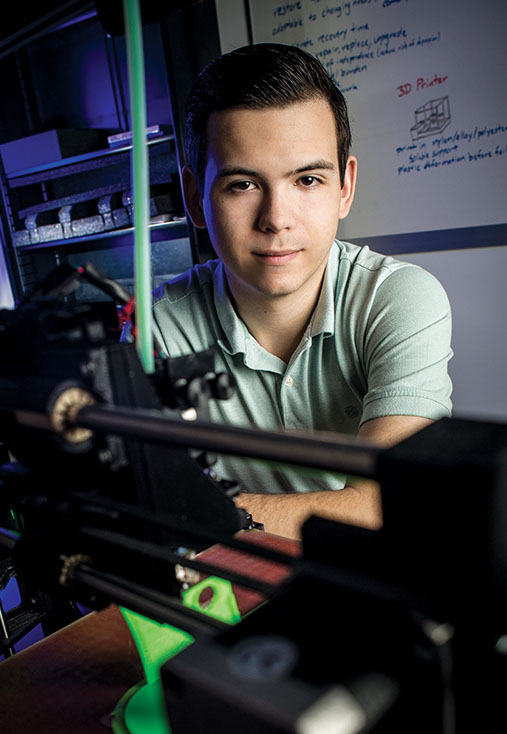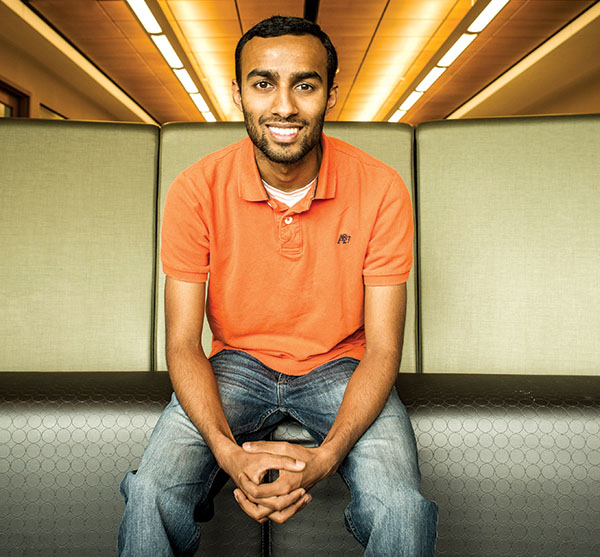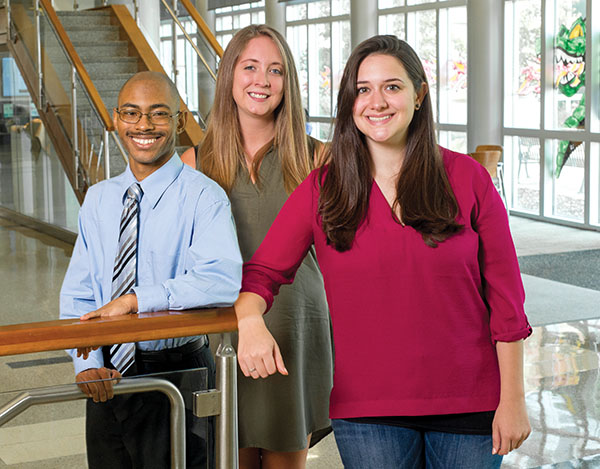At a time of year when many students are planning their spring break, a select group from UAB has been shaping a brighter future for people around the world. In March 2015, 17 students were invited to join more than 1,000 peers at the Clinton Global Initiative University (CGIU) summit in Miami; the year before, seven attended the CGIU summit in Phoenix.
Founded by former President Bill Clinton, CGIU helps future leaders jump-start their ideas and engage in topics they’re passionate about, says Libba Vaughan, UAB’s director of service learning. The students earned their tickets by developing Commitments to Action—ambitious, specific, measurable initiatives to benefit communities, either at home or continents away, through education, environmental and climate change, peace and human rights, poverty alleviation, or public health. Here, a few of the CGIU attendees describe the summits and the progress of their projects:
Forrest Satterfield
Junior, Biomedical Engineering, Huntsville, Ala.
Ever since middle school, Satterfield has dreamed of building an exoskeleton that could help people who have lost limbs or limb function. But the challenge comes in creating something that’s not too big, too bulky, and too expensive for most patients to use. Satterfield’s solution literally breaks down that problem into pieces: He plans to produce a set of actuators—computer-operated electric motors to power prosthetics and orthotics—that can connect with braces custom-made for each patient on a 3-D printer.

Patients “will be able to build up a bigger system over time,” creating a setup that “will be affordable for anyone,” Satterfield explains. Affordability, in turn, will increase accessibility, giving more patients the opportunity to enjoy improved movement—and a better quality of life—he adds.
At the Phoenix CGIU summit, Satterfield attended talks from dignitaries including Senator John McCain; he also learned valuable information about fund-raising to support his Commitment to Action, and how to present his idea to potential partners. Meeting other young innovators from around the world was especially exciting, Satterfield says, recalling conversations with students from Syria and Australia. “Going to CGIU is a lot like going to the United Nations,” he says. “There are so many points of view and so many things to learn.”
CGIU recognition gave Satterfield’s actuator-and-brace idea “legitimacy,” he says. After stints in UAB’s Center for Biophysical Sciences and Engineering and UAB’s Edge of Chaos, Satterfield has formed a company—the first student-run start-up in the Collat School of Business Innovation Lab, located inside Birmingham’s Innovation Depot. (Learn more about the Innovation Lab.) There, Satterfield and a student team have created a foot orthotic to prove his concept works. Now he’s seeking funding for further development, with a goal of helping patients and supporting Birmingham’s growth. “I want our headquarters and manufacturing here so that we can create jobs and improve lives,” Satterfield says.
“CGIU has been the most important experience of my academic life,” he adds. “They took a risk on my idea and said yes, you can do it.”
Raghu Kasa
Senior, Public Health/UAB Honors College, Greensboro, Ala.
Kasa wants UAB students to become ambassadors for millions of people living in poverty in sub-Saharan Africa. He is establishing a campus chapter of ONE, an international organization addressing preventable disease, hunger, and other problems of extreme poverty through political advocacy.

“Federal programs such as PEPFAR (President’s Emergency Plan for AIDS Relief) have helped achieve some goals in Africa, such as reducing AIDS to a point where more people are receiving treatment than getting infected,” says Kasa. “If these programs continue, then we could greatly reduce poverty and other issues in sub-Saharan Africa by 2030.”
Attending the CGIU summit was eye-opening, he says. The U.S. surgeon general and actress/activist America Ferrera were among the first set of speakers, with Bill Clinton as moderator. Others included scientists, CEOs, and a Nobel Peace Prize laureate. Kasa also met other university students figuring out how to fight Ebola and develop better screening methods for human papillomavirus (HPV) and cancer. The summit ended with Kasa’s favorite day—a day of service, with students volunteering for community revitalization and improvement projects in Miami neighborhoods.
Back in Birmingham, Kasa has launched UAB’s ONE chapter and started raising awareness about global poverty. Soon, he and fellow UAB activists will begin urging local, state, and national political leaders to support poverty programs. Earlier this year, Kasa and other ONE chapter leaders met with members of Congress. “They said they would keep our concerns in mind when making decisions,” Kasa says. “I know I can make an impact.”
Kasa, who hopes to work with Doctors Without Borders as a physician, says that CGIU continues to motivate him. “Each person there is making the world a better place,” he says. “I want to do my part and help in a global way.”
Jessica Deitzer
Master’s Student, Criminal Justice, Scranton, Penn.
Julien Grayer
Master’s Student, Criminal Justice, New Orleans, La.
Megan Webb
Master’s Student, Criminal Justice/Public Administration, Birmingham
The trio discovered a cause to champion while studying criminal-justice policy. “We read about public misconceptions of the criminal-justice system and the media’s tendency to contribute by reporting extreme or incorrect crime news to increase viewership,” explains Deitzer (at right in photo). In turn, the public and politicians have favored tough-on-crime policies leading to “maladaptive effects” such as prison overcrowding, she adds. “There is a large divide between the public, researchers, and policymakers.”

The group’s solution is to develop a new media source—a website that uses objective, empirical data to cover crime and justice, presented in an attention-grabbing, interactive, easy-to-read manner. Confronting misinformation could lead to more evidence-based policies, they note.
The Miami CGIU summit provided Deitzer, Grayer (at left in photo), and Webb (at center) with inspiration and confidence. Webb enjoyed hearing speakers and students describe their meaningful work. Their successes “helped me realize that our project—though it will be a long road and require a lot of hard work—is within reach,” Deitzer adds.
Securing funding to research misinformation and media impact is the next step. The data will provide the backbone for the site’s initial content—and perhaps shape their academic futures, say the students. “CGIU has helped me further develop an idea I believe in,” says Deitzer, who aims to become a criminology professor. “This project could become a dissertation or career focus for me.” Webb plans to study criminology or sociology, with criminal justice policy as a primary research interest.
The three students will involve more academics and scholars as the website project grows. Grayer says that CGIU helped him understand the power of networking and collaboration—and “how to further develop understanding of my field to the point where specific ideas can materialize.”
• Meet the 21 newest CGIU scholars from UAB, and discover how they're putting their ideas into action.
• Learn more about UAB's connections to the CGIU Network and the application process.


